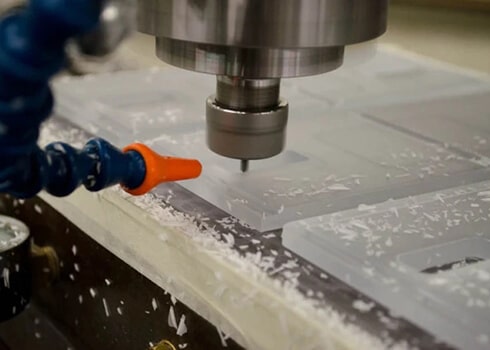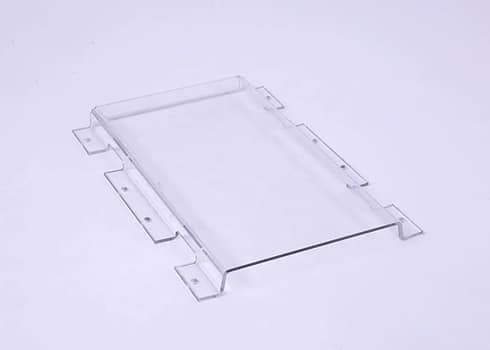Polypropylene CNC Machining Services
Polypropylene (PP) is a type of plastic that is known for its toughness and fatigue resistance and is also considered safe as it is free of BPA. It is lightweight and highly popular in various industries like automotive, packaging, and consumer goods. However, machining PP can be challenging due to its tendency to melt and gall. If you have any polypropylene machining needs, you can rely on Runsom Precision, our advanced CNC machines can handle even the most intricate polypropylene milling tasks to create high-quality parts for your specific requirements.
CNC Machining in Polypropylene?

CNC machining often uses polypropylene sheets, especially for prototyping small batches of polypropylene parts. Polypropylene is known as a generally soft material difficult to machine due to its low annealing temperature causing deformation under heat, it therefore requires skilled CNC machining experts to craft it with precision. Runsom Precision specializes in producing high-quality plastic parts for various industries and has extensive experience in machining these parts. We provide Polypropylene Milled Parts to clients in the medical, marine, power control industries, and more.
PP CNC Machining Specification
Application
Packaging, household appliances, electrical equipment, BPA-free food containers, medical products.
Tolerances
It is determined by the desired effect and the PP type used. A tolerance of ±0.005” (±0.13 mm) is available at Runsom.
Advantages
Good resistance to fatigue and a wide range of bases and acids, low density.
Wall Thickness
It is mostly decided by the PP type and part geometry. A minimum wall thickness of ±0.03” (±0.8 mm) is available at Runsom.
Lead Time
As fast as 3 days, but it will be finally determined by part complexity and order quantity.
Max Part Size
The available size is mostly determined by the machine and part geometry.
Processes
3-axis & 5-axis CNC milling.
Finishes
As Machined, Bead Blast.
Polypropylene/PP Types
Polypropylene or PP, a thermoplastic with a semi-crystalline structure, exists in two distinct types: homopolymers or copolymers.
1. Homopolymer Polypropylene
The most widely used type of PP is Homopolymer Polypropylene, known for its superior strength-to-weight ratio. It has better stiffness, and durability compared to Copolymer. It also boasts commendable chemical resistance and weldability, making it a viable option for constructing anti-corrosion structures.
2. Copolymer Polypropylene
By polymerizing propene and ethane, the copolymer group can be classified into two categories, namely random copolymers and block copolymers:
Random Copolymer: A Random Copolymer is formed by polymerizing ethene and propene jointly. These copolymers have excellent transparency and flexibility, and are perfect for creating visually appealing products that require transparency. Typically, ethene units can account for up to 6% of the copolymer's total mass.
Block Copolymer: Polypropylene Block Copolymer contains a higher percentage of ethene (ranging from 5 to 15 percent) and is composed of co-monomer units that are arranged in a systematic way. Due to this regular pattern, the thermoplastic material is more resilient and less prone to becoming brittle than random copolymers. These polymers are suitable for high-strength purposes, particularly in industrial settings.
Generic Polypropylene Properties
Despite the difficulties in CNC machining polypropylene caused by its propensity to gall and melt, CNC machined parts made from homopolymer polypropylene can offer numerous advantages. Its smooth surface makes it especially suitable for mechanical components like gears, and its excellent fatigue resistance allows for the inclusion of thin features like living hinges in designs.
Tensile Strength, Yield
(MPa)
19-45
Elongation at Break
(%)
8-750
Hardness
(Rockwell R)
49-81
Heat Deflection Temperature
(°C)
60-129
Glass Transition Temperature
(°C)
130-174
Surface Finishes for CNC Machined PP Parts

Polypropylene components have an inherent off-white hue and are not conducive to surface treatments like painting. Additionally, due to its hydrophobic properties, PP is extremely resistant to dyeing.
1. As Machined: Leaving the part in an as-machined state is the most common surface finishing option for those employing CNC machining in polypropylene.
2. Bead Blast: Polypropylene can leave burrs on part edges during CNC machining, and the material is prone to melting when in contact with the cutting tool. This often results in a surface finish that is not up to par, requiring additional sanding with coarse sandpaper or media.
Advantages of Polypropylene Machined Parts
1. Impact Resistance
CNC machined polypropylene parts have shock absorbance capabilities, making them a reliable choice for protecting the objects they are used for. This quality sets them apart from other plastics and makes them a preferred option.
2. Mechanical Strength
Automotive and heavy machinery industries frequently use polypropylene parts to provide mechanical support and stability. These parts can be produced with precision and reliability with CNC machining methods.
3. Lightweight
Polypropylene stands out among plastics for its relatively low density, which results in parts that are lighter and more cost-effective to manufacture. CNC machining is a great way to create parts with this material efficiently.
4. Tensile Toughness
With its high tensile toughness and ability to withstand stresses of up to 4,800 psi, polypropylene is an ideal material for creating parts that will be subjected to heavy loads. These parts can be effectively fabricated using CNC machining techniques.
5. Moisture Resistance
The water-resistant property of polypropylene makes this material highly versatile and ideal for use across various industries, particularly in the sanitary sector. The moisture-resistant quality of polypropylene allows for its use in underground pipelines and in the production of other sanitary and renovation products.
6. Non-toxic
Polypropylene sheets, a safe material, are commonly used in the production of food plates. This ensures that the food items produced meet FDA requirements and are suitable for use in the food industry.
Common PP Machined Parts
Typical CNC machined PP parts or components we produced include:
Machining PP FAQs
Despite the difficulty of machining polypropylene due to its tendency to melt and gall, homopolymer polypropylene remains a favorable option for CNC machined parts with several benefits.
PP is an ideal material for making laboratory devices and various containers since it can withstand numerous solvents and chemicals. Additionally, it provides excellent resistance against wear and tear.
Polypropylene has several drawbacks, including:
- A lack of resistance to post-coating treatments like paint or ink once it has cooled.
- Overheating can cause the fibers to break.
- PP is highly flammable and will melt at 260° Celsius, making it unsuitable for high-temperature applications.
- It is also vulnerable to oxidation-induced degradation, leading to cracking and crazing.
- It is susceptible to UV damage.
Yes, polypropylene is an affordable plastic material suitable for medical use. It is commonly employed in situations that require steam sterilization and has gained popularity in the medical industry because of its transparent nature and sterilization capabilities. With its ability to withstand high temperatures, cleaning agents, solvents, and disinfectants, and its moderate cost, PP is projected to continue being used in the field of medicine for a long time.
Yes, polypropylene (PP) is lightweight but can bear heavy loads and has excellent fatigue strength. Additionally, it can effectively resist numerous solvents and chemicals, making it appropriate for creating laboratory equipment and containers for various applications. Therefore, PP is a trustworthy and practical material.
